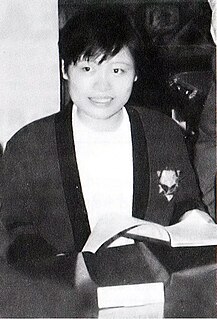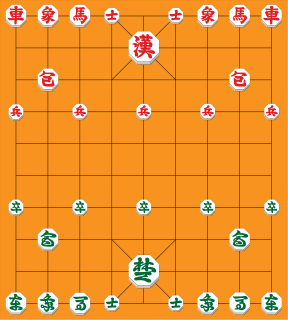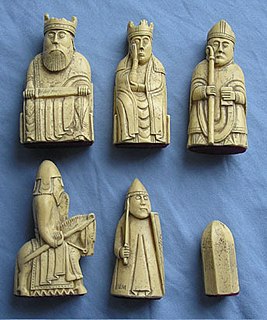This page is based on this
Wikipedia article Text is available under the
CC BY-SA 4.0 license; additional terms may apply.
Images, videos and audio are available under their respective licenses.

Shogi , also known as Japanese chess or the Game of Generals, is a two-player strategy board game native to Japan in the same family as chess, makruk, shatranj, janggi and xiangqi, and is the most popular chess variant in Japan. Shōgi means general's board game.
The Computer Olympiad is a multi-games event in which computer programs compete against each other. For many games, the Computer Olympiads are an opportunity to claim the "world's best computer player" title. First contested in 1989, the majority of the games are board games but other games such as Bridge take place as well. In 2010, several puzzles were included in the competition.

Go is an abstract strategy board game for two players, in which the aim is to surround more territory than the opponent. The game was invented in China more than 2,500 years ago and is believed to be the oldest board game continuously played to the present day.
A 2016 survey by the International Go Federation's 75 member nations found that there are over 46 million people worldwide who know how to play Go and over 20 million current players, the majority of whom live in East Asia.
One of the most common ways for chess historians to trace when the board game chess entered a country is to look at the literature of that country. Although due to the names associated with chess sometimes being used for more than one game, the only certain reference to chess is often several hundred years later than uncertain earlier references. The following list contains the earliest references to chess or chess-like games.

XBoard is a graphical user interface chessboard for chess engines under the X Window System. It is developed and maintained as free software by the GNU project. WinBoard is a port of XBoard to run natively on Microsoft Windows.

Xie Jun is a Chinese chess grandmaster. She had two separate reigns as Women's World Chess Champion, from 1991 to 1996 and again from 1999 to 2001. Xie is one of three women to have at least two separate reigns, besides Elisabeth Bykova and Hou Yifan.

Buxus is a genus of about 70 species in the family Buxaceae. Common names include box or boxwood.

Janggi, sometimes called Korean chess, is a strategy board game popular in Korea. The game derived from xiangqi and is very similar to it, including the starting position of the pieces, and the 9×10 gameboard, but without the xiangqi "river" dividing the board horizontally in the middle.

The game of Go originated in China in ancient times. It was considered one of the four essential arts of a cultured Chinese scholar in antiquity and is described as a worthy pastime for a gentleman in the Analects of Confucius. It reached Korea by the 5th century, in the 7th century it had reached Japan. The game was described by Thomas Hyde in 1694, but it did not become popular in the West until the late 19th century.

Jungle or Dou Shou Qi is a modern Chinese board game with an obscure history. The game is played on a 7×9 board and is popular with children in the Far East. The game is also known as The Jungle Game, Children's Chess, Oriental Chess, and Animal Chess.

The history of chess can be traced back nearly 1500 years, although the earliest origins are uncertain. The earliest predecessor of the game probably originated in India, before the 6th century AD; a minority of historians believe the game originated in China. From India, the game spread to Persia. When the Arabs conquered Persia, chess was taken up by the Muslim world and subsequently spread to Southern Europe. In Europe, chess evolved into roughly its current form in the 15th century.

Tan Zhongyi is a Chinese chess grandmaster (GM) and former Women's World Chess Champion (2017–2018).

Ding Liren is a Chinese chess grandmaster. He is a three-time Chinese Chess Champion.

The 40th Chess Olympiad, organised by the Fédération Internationale des Échecs and comprising an open and women's tournament, as well as several events designed to promote the game of chess, took place in Istanbul, Turkey, from 27 August to 10 September 2012. The city also hosted the event in 2000.

The first World Mind Sports Games (WMSG) were held in Beijing, China from October 3 to 18, 2008, about two months after the Olympic Games. They were sponsored and organised by the International Mind Sports Association with the General Administration of Sport of China and the Beijing Municipal Bureau of Sport.
















